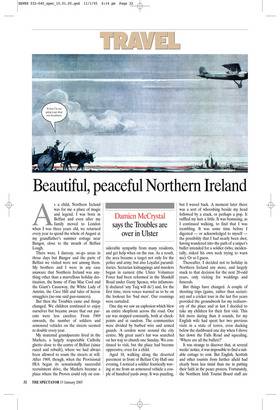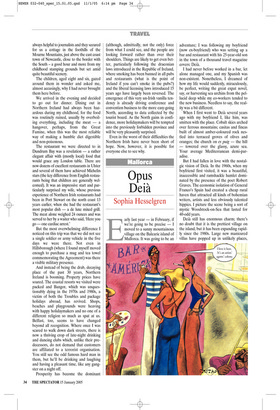Beautiful, peaceful Northern Ireland
As a child, Northern Ireland was for me a place of magic and legend. I was born in Belfast and even after my family moved to London when I was three years old, we returned every year to spend the whole of August at my grandfather’s summer cottage near Bangor, close to the mouth of Belfast Lough.
There were, I daresay, no-go areas in those days but Bangor and the parts of Belfast we visited were not among them. My brothers and I were in any case unaware that Northern Ireland was anything other than a marvellous holiday destination, the home of Finn Mac Cool and the Giant’s Causeway, the White Lady of Antrim, the Cave Hill and tales of heroic smugglers (no one said gun-runners).
But then the Troubles came and things changed. We children continued to enjoy ourselves but became aware that our parents were less carefree. From 1969 onwards, the number of soldiers and armoured vehicles on the streets seemed to double every year.
My maternal grandparents lived in the Markets, a largely respectable Catholic ghetto close to the centre of Belfast (since razed and rebuilt), where we had always been allowed to roam the streets at will. After 1969, though, when the Provisional IRA began its sensationally successful recruitment drive, the Markets became a place where the Provos could rely on con siderable sympathy from many residents, and get help when on the run. As a result, the area became a target not only for the police and army, but also Loyalist paramilitaries. Sectarian kidnappings and murders began in earnest (the Ulster Volunteer Force had been reformed in the Shankill Road under Gusty Spence, who infamously declared ‘any Taig will do’) and, for the first time, stern voices warned us to be on the lookout for ‘bad men’. Our roamings were curtailed.
One day we saw an explosion which blew an entire shopfront across the road. Our car was stopped constantly, both at checkpoints and at random. The communities were divided by barbed wire and armed guards. A cordon went around the city centre. My great aunt’s hat was searched on her way to church one Sunday. We continued to visit, but the place had become oppressive, even for a child.
Aged 18, walking along the deserted pavement in front of Belfast City Hall one evening, I noticed a soldier frantically waving at me from an armoured vehicle a couple of hundred yards away. It was puzzling, but I waved back. A moment later there was a sort of whooshing beside my head followed by a crack, or perhaps a pop. It ruffled my hair a little. It was bemusing, as I continued walking, to find that I was trembling. It was some time before I digested — or acknowledged to myself the possibility that I had nearly been shot, having wandered into the path of a sniper’s bullet intended for a soldier (who, incidentally, risked his own neck trying to warn me). Or so I guess.
Thereafter, I decided not to holiday in Northern Ireland any more, and largely stuck to that decision for the next 20-odd years, only visiting for weddings and funerals.
But things have changed. A couple of shooting trips (game, rather than sectarian) and a cricket tour in the last five years provided the groundwork for my rediscovery of the place and at last I decided to take my children for their first visit. This felt more daring than it sounds, for my English wife had spent her two previous visits in a state of terror, even ducking below the dashboard one day when I drove her down the Falls Road and squealing, ‘Where are all the bullets?’ It was strange to discover that, at several weeks’ notice, it was impossible to find a suitable cottage to rent. But English, Scottish and other tourists from further afield had clearly been less timid than me in putting their faith in the peace process. Fortunately, the Northern Irish Tourist Board staff are always helpful to journalists and they secured for us a cottage in the foothills of the Mourne Mountains, just above the east coast town of Newcastle, close to the border with the South – a good hour and more from my childhood stamping grounds but set amid quite beautiful scenery.
The children, aged eight and six, gazed around them in wonder and asked me, almost accusingly, why I had never brought them here before.
We arrived in the evening and decided to go out for dinner. Dining out in Northern Ireland had always been hazardous during my childhood, for the food was routinely ruined, usually by overboiling everything, including the meat — a hangover, perhaps, from the Great Famine, when this was the most reliable way of making a humble diet digestible and non-poisonous.
The restaurant we were directed to in Dundrum Bay was a revelation — a rather elegant affair with (mostly local) food that would grace any London table. There are now dozens of excellent restaurants in Ulster and several of them have achieved Michelin stars (the key difference from English restaurants being that children are generally welcomed). It was an impressive start and particularly surprised my wife, whose previous experience of Northern Irish restaurants had been in Port Stewart on the north coast 13 years earlier, when she had the restaurant’s most popular dish — a de luxe mixed grill. The meat alone weighed 24 ounces and was served to her by a waiter who said, ‘Here you go — one cardiac arrest.’ But the most overwhelming difference I noticed on this trip was that we did not see a single soldier or army vehicle in the five days we were there. Not even in Hillsborough (where I found myself moved enough to purchase a mug and tea towel commemorating the Agreement) was there a visible military presence.
And instead of being the drab, decaying place of the past 30 years, Northern Ireland is booming. Property prices have soared. The coastal resorts we visited were packed and Bangor, which was unquestionably dying in the 1970s and 1980s, a victim of both the Troubles and package holidays abroad, has revived. Shops, beaches and playgrounds were heaving with happy holidaymakers and no one of a different religion so much as spat at us. Belfast, too, seems to have changed beyond all recognition. Where once I was scared to walk down dark streets, there is now a thriving crop of late-night drinking and dancing clubs which, unlike their predecessors, do not demand that customers are affiliated to a terrorist organisation. You still see the odd famous hard man in them, but he’ll be drinking and laughing and having a pleasant time, like any gangster on a night off.
Prosperity has become the dominant (although, admittedly, not the only) force from what I could see, and the people are looking forward rather than over their shoulders. Things are likely to get even better, particularly following the draconian laws introduced in the Republic of Ireland, where smoking has been banned in all pubs and restaurants (what is the point of Ireland if you can’t smoke in the pubs?) and the liberal licensing laws introduced 15 years ago have largely been reversed. The emergence of this very un-Irish vanilla tendency is already driving conference and convention business to the more easy-going North, according to data collected by the tourist board. As the North gains in confidence, more holidaymakers will be tempted into the previously forbidden province and will be very pleasantly surprised.
Even in the worst of their difficulties the Northern Irish have never been short of hope. Now, however, it is possible for everyone else to see why.






















































 Previous page
Previous page